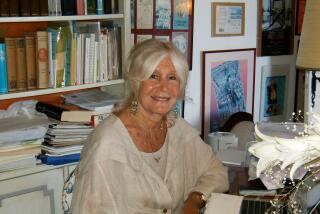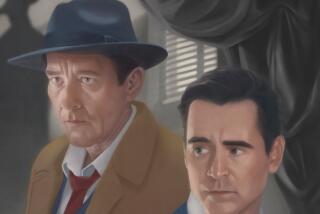14 things you don’t know about James M. Cain
Today is James M. Cain’s birthday; the titan of noir writing was born July 1, 1892. The longtime writer is best known for three books that were made into now-classic films: “The Postman Always Rings Twice,” “Mildren Pierce” and “Double Indemnity.”
Born and raised on the East Coast and trained as a journalist, Cain moved to Los Angeles in the 1930s, around the time his first book was published. He returned to the East Coast about 15 years later, but it was in Los Angeles, a place he had conflicting feelings about, that Cain had his greatest success.
To celebrate his birthday, here are 14 things you probably didn’t know about him:
1. Cain’s first novel “The Postman Always Rings Twice” was rejected by publishers -- twice.
2. In his time, he was called “the 20-minute egg of hard-boiled fiction.” Which means very, very hard.
3. He wrote lines like, “I loved her like a rabbit loved a rattlesnake.” That’s from the novel “Double Indemnity.”
4. Cain was in high demand in Hollywood, but the relationship was fraught. A complete rewrite he did of the screenplay “Out of the Past” had to be rewritten again after he was done.
5. About producers and publishers Cain once said, “They don’t know what they want. They only think they do.”
6. Describing Cain, a director once said he “looks like an ex-Sheriff of San Berarndino.” In fact, he was an ex-journalist from Maryland.
7. Cain served as a private in France in World War I.
8. When he went to war, he had already earned a master’s degree.
9. He was married four times.
10. In 1943, he was granted a divorce from second wife Elina Cain. The settlement included a payment of $27,500 -- when she was making 65 cents an hour as a “war worker.”
11. When she filed for divorce, Elina Cain said that Cain was “morose, sarcastic and insulting.”
12. About a year after that divorce, Cain married Aileen Pringle, a former silent film star.
13. When Pringle and Cain divorced two years later, Pringle described Cain as “moody, melancholoy and grim” and said he built “mental dungeons, instead of castles in the air.”
14. In “Paradise,” a 1933 cover story about Los Angeles published in H.L. Mencken’s American Mercury magazine, Cain wrote, “the sunlight gives everything the unmoving quality of things seen in a desert. And of course this is greatly aggravated by the similarity of the seasons, in itself. Nothing changes. Summer follows Winter without a Spring, Winter follows Summer without a Fall. The citrus trees flower and bear all at the same time: you never get a riot of blossoms as you do in Western Maryland when the apple-trees are in bloom, or a catharsis of stinking, primitive accomplishment, as you do in Delaware when the tomatoes go to the cannery. Here the oil wells flow right along, so do the orange trees, so does everything. It is terrifying.”
Like passing notes in class; I’m @paperhaus on Twitter
More to Read
Sign up for our Book Club newsletter
Get the latest news, events and more from the Los Angeles Times Book Club, and help us get L.A. reading and talking.
You may occasionally receive promotional content from the Los Angeles Times.











